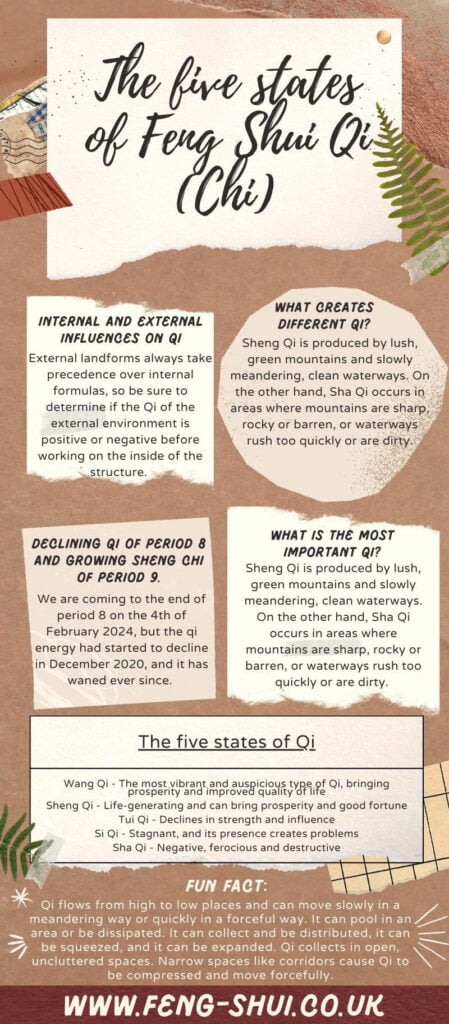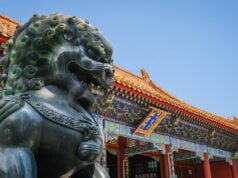
The five states of Feng Shui Qi (Chi)
Michael Hanna
 Qi can take any of five general states: Prosperous, Growing, Retreating, Dead or Killing and with period 9 around the corner in February 2024, you will need to understand the different states of qi and also what good (sheng) and negative (sha) is and how it interacts with the Feng Shui flying stars.
Qi can take any of five general states: Prosperous, Growing, Retreating, Dead or Killing and with period 9 around the corner in February 2024, you will need to understand the different states of qi and also what good (sheng) and negative (sha) is and how it interacts with the Feng Shui flying stars.
Prosperous Qi is known as Wang Qi. This is the most vibrant and auspicious type of Qi, bringing prosperity and improved quality of life. Wang Qi is strong and nurturing, and its presence helps accelerate performance. Wang Qi is the most important Qi within an area, and this is the first area in a Feng Shui consultation that we try to enhance as this can bring fast results when activated.
Growing Qi is also called Sheng Qi. It is life-generating and can bring prosperity and good fortune to our lives. The presence of Sheng Qi accelerates opportunities and progress, sharpens our thinking, and stabilises our emotions.
Retreating Qi, also called Tui Qi, declines in strength and influence.
Dead Qi is also called Si Qi. It is stagnant, and its presence creates problems and suffering. Si Qi is deadly. It hinders performance and upsets the balance of energy.
Finally, Killing Qi or Sha Qi is negative, ferocious and destructive. It is powerful and menacing. It can have far-reaching adverse effects and is the opposite of Sheng Qi. Sha Qi reduces vitality and has a blinding effect on one’s performance or thinking.
Of these five states of Qi, the most important to consider are Wang Qi, Sheng Qi and Sha Qi.
 Sheng Qi is produced by lush, green mountains and slowly meandering, clean waterways. On the other hand, Sha Qi occurs in areas where mountains are sharp, rocky or barren, or waterways rush too quickly or are dirty. Windswept areas are also indicative of the presence of Sha Qi since wind can disperse Qi.
Sheng Qi is produced by lush, green mountains and slowly meandering, clean waterways. On the other hand, Sha Qi occurs in areas where mountains are sharp, rocky or barren, or waterways rush too quickly or are dirty. Windswept areas are also indicative of the presence of Sha Qi since wind can disperse Qi.
Internal and External Influences on Qi
External landforms always take precedence over internal formulas, so be sure to determine if the Qi of the external environment is positive or negative before working on the inside of the structure. If the external environment is inauspicious, your efforts inside will mostly go to waste.
It is essential for those who live in urban environments to point out that artificial structures do not generate Qi as natural landforms do. However, large artificial structures can block, conduct or redirect Qi. They can also transform Sheng Qi into Sha Qi. Therefore, neighbouring buildings or roads can carry Sheng or Sha Qi. Meandering roads with slower-moving traffic are conductors of Sheng Qi, while fast-moving, noisy traffic moves Sha Qi.
External landforms which form sharp or hostile shapes can also cause Qi to become negative. Examples include pillars, lampposts or dead trees directly in front of a property’s main door. One of the worst examples is a road pointing directly at your home. Narrow or dark passageways can also foster Sha Qi. On the other hand, an expansive, open space that allows Qi to gather outside your home and meanders gently brings Sheng Qi. Such a space is referred to as a “Bright Hall” or “Ming Tang”.
The Flow of Qi
Qi flows from high to low places and can move slowly in a meandering way or quickly in a forceful way. It can pool in an area or be dissipated. It can collect and be distributed, it can be squeezed, and it can be expanded. Qi collects in open, uncluttered spaces. Narrow spaces like corridors cause Qi to be compressed and move forcefully.
Because Qi flows downward and not upward, the Qi on an upper floor of a building is always more passive than the Qi on the lower floor. This is why it is better to have more active rooms like living rooms on the ground floor and bedrooms on the upper floor. Qi should not stagnate, so it is a good idea to air spaces out regularly to allow Qi to circulate freely.

In 2022, year of the Yang Water Tiger.
It is essential to keep sure you do not have any sha Qi in the north, northeast or southwest as these areas are severely affiliated in 2022, and you must place all the annual Feng Shui cures and enhancers. If you follow this link, you will find more details on the year ahead.
Declining qi of period 8 and growing Sheng chi of period 9.
We are coming to the end of period 8 on the 4th of February 2024, but the qi energy had started to decline in December 2020, and it has waned ever since. As Feng Shui consultants, we have been activating the sheng chi energy of the #9 purple star and also the #1 star with amazing success.
I hope you have enjoyed this article on the five states of Qi, and if you have any comments or questions, please leave them in the box below.
Best wishes
Michael









[…] approaching in February 2024, you will need to understand what sheng and sha Qi is and also, the different states of qi and how it interacts with the Xuan Kong flying stars and, in particular, the #9, #1, #2, #8 and #6 […]
[…] Shui involves the harnessing of energy known as Qi (Chi) to benefit us in our lives. This energy is formed from the interaction between two polarities of […]